When it comes to animals that we should all fear at least a little, speed is most certainly a large factor. Some of the fastest animals in the world are capable of running laps around you in seconds. Think about it like a NASCAR race, you’re bound to be lapped by a lot of animals several times. In fact, some of the fastest animals in the world today exceed speeds that would get them speeding tickets on most American highways. Yet some move so fast that not even our fastest cars can keep up with. Of course, some of the fastest animals on the planet are on land. However, we should not forget about the air and sea as well.
They house some of the fastest creatures you’ll ever come across. Of course, they are not running as you’ll see with land-based animals. Rather, they are swimming or flying at an incredibly fast rate. Do keep in mind, however, that even the most moderate speed of most animals can be faster than the average human. The question many would like to know by now, we’re sure, is: Well, who are these incredibly fast animals? Let’s dive into that right now!

The Hippopotamus
- Speed: Around 30 MPH
The Hippopotamus is a deceptive creature for its size. The species is incredibly strong and large, weighing in at an average of 3,000 to 4,000lbs. One would surmise that, due to this, they should not be able to move that quick. Yet not only do they move fast for their size pound for pound on land, but they can also move quickly underwater too. They are quite territorial and are known for attacking humans and even random animals that just come wandering by. Of course, many do not assume that they are as dangerous as they happen to be.
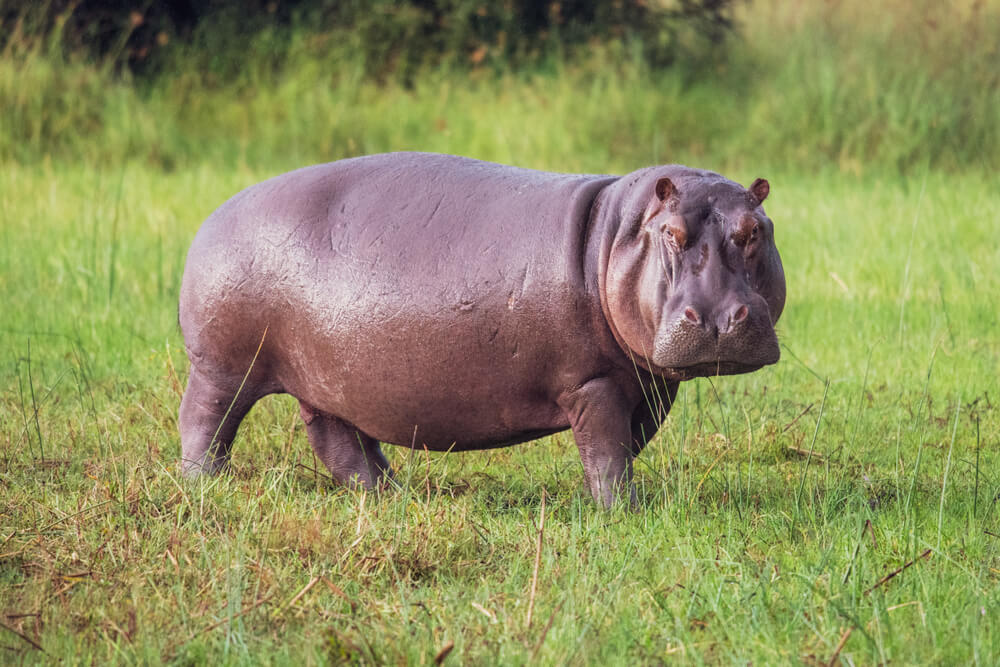
Yet Hippos are responsible for more human deaths each year than all other African creatures combined. In 2019 alone, Hippos killed around 500 people. Their deceptive speed is certainly to thank for this, as many humans do not realize how fast they will be attacked. One other thing people should keep in mind is that they will chase people for a long period of time. There are instances where Hippos were said to have chased humans for about a mile or two before finally giving up. This species does not play!
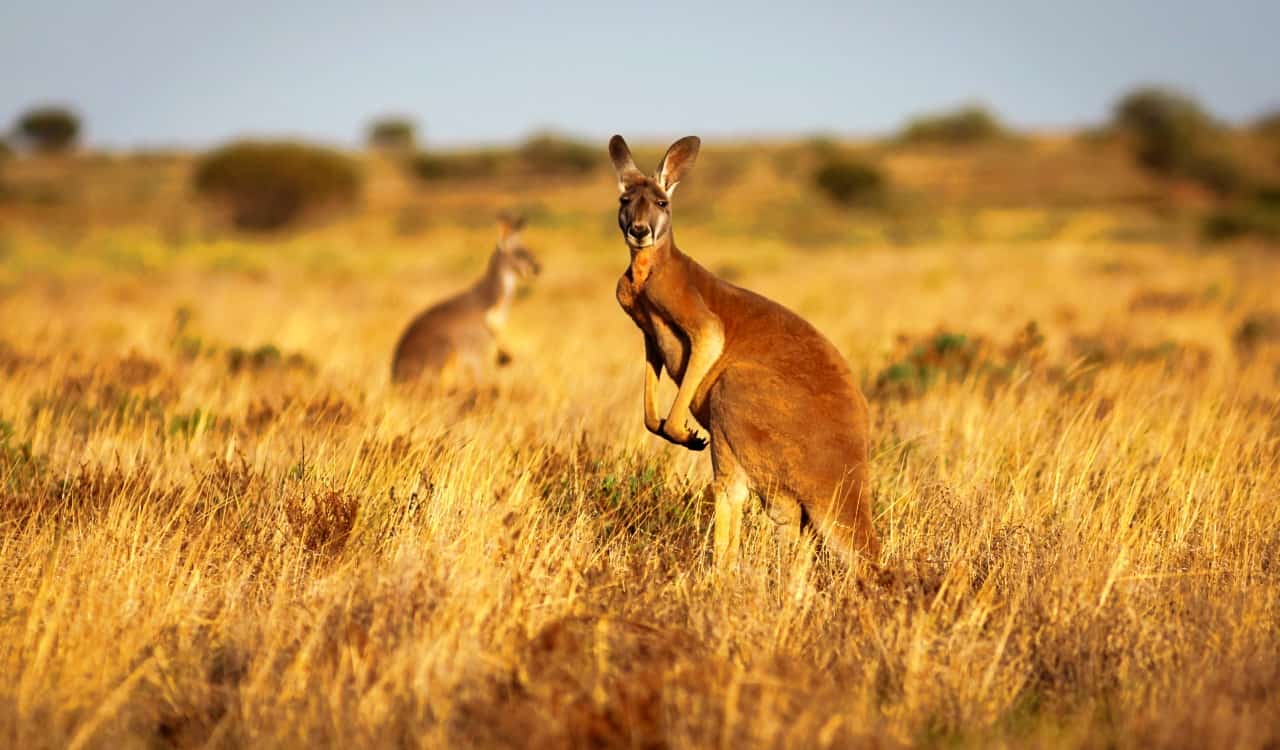
Red Kangaroo
- Speed: Around 35 MPH
Kangaroos are quite powerful creatures. They are capable of kicking human beings so hard that we could go flying if they truly wanted to harm us. Of course, Kangaroos do not tend to be violent toward humans unless they feel threatened. The infamous boxing kangaroos always attacked humans because they were being attacked too. This is not a common feature. While every kangaroo species can move around pretty fast, the Red Kangaroo is the fastest. This is the largest of the Kangaroo species, and also the largest terrestrial mammal in Australia.
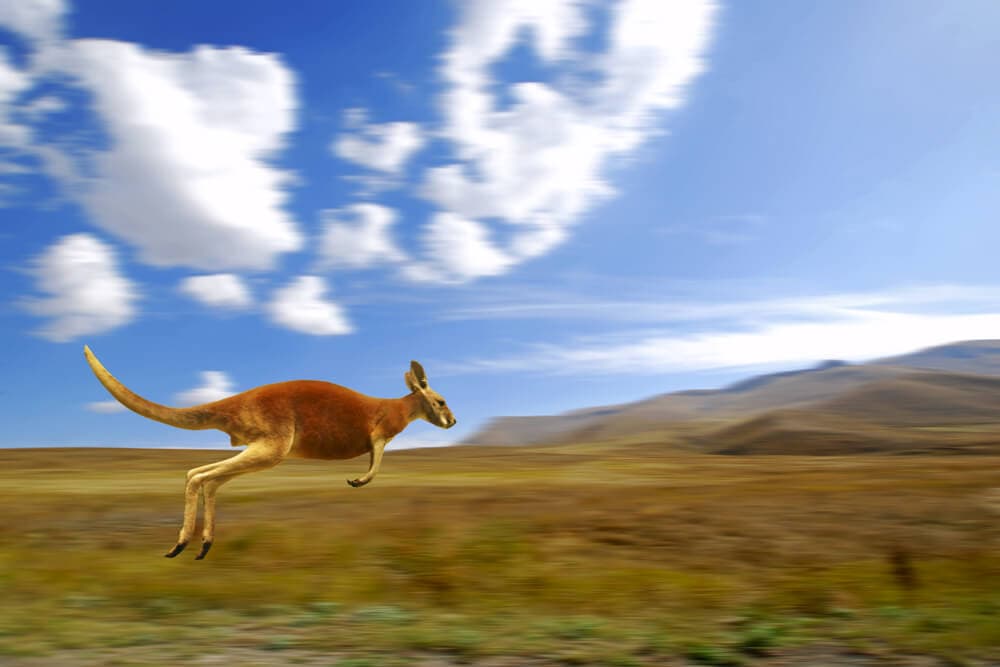
Like all kangaroos, the legs of the Red Kangaroo species are incredibly powerful. They are capable of hoping around the Australian Outback pretty fast, which can be a must. A lot of deadly creatures live in Australia, so being able to move at high speeds is incredibly useful. Red Kangaroos have been known to hop around at a speed of roughly 35 mph. However, it is possible that they can reach up to 40 mph if they really pushed themselves to do so. Especially if it is a young, powerful Red Kangaroo.

Elk
- Speed: Around 40 MPH
The Elk species can be found throughout most of North America and the Eurasian territory. More often than not, people assume they are only in colder environments. While it is true that they tend to be found a lot in these areas, they are also known to thrive in warmer places too. Of course, the Moose species (very similar to the Elk) tends to thrive more in the cold. While not native to South America, Elk has been introduced in the wild here and they have managed to do quite well. Of course, the species is known for being incredibly large.
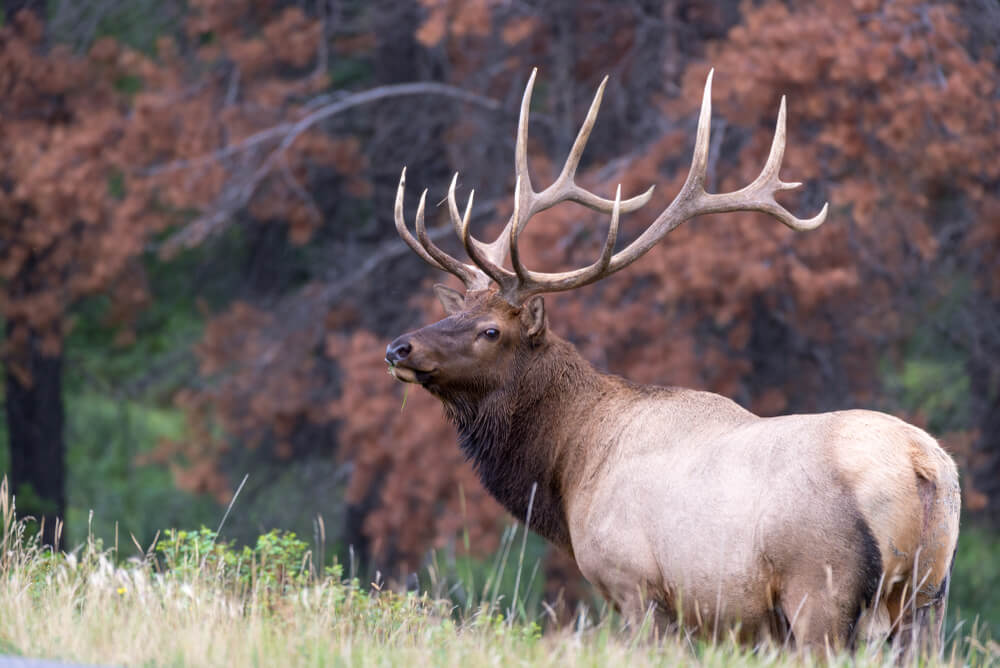
Depending on the version of Elk you come across, they could be extremely territorial or docile. Yet most of them are aggressive during the mating season. The males of the species are known for using their large antlers, which they actually shed annually. When they want to attack, they do not mind running after anyone, even humans. They can reach upwards of 40 mph, which also helps them escape potential predators such as cougars, wolves, and coyotes.

Greyhound Dog
- Speed: Around 45 MPH
Greyhound Dogs are potentially known the most for being notable racing dogs that you’ll often see people betting on across the United States. Of course, these dogs are known for being relatively large and even pretty skinny. The skinniest of the Greyhounds tend to be those who are forced to regularly race. However, those that become family pets are in good shape. They might still be skinny as this species is still going to be a bit taller/longer, but that is just how they are.

Many feel that the repeated use in racing, and the training they are put through for it, can cut down on their lifespan. This does make sense, as the same can occur in racehorses and other animals forced into long-term racing. However, it is understandable why the species is put into racing. It is one of the fastest animals on the planet and certainly among the fastest dogs. They tend to regularly reach 27 mph without trying, but they are also able to reach 40 mph. It is not surprising why Greyhounds have been in the world of racing in some form for more than a century.

Brown Hare
- Speed: Around 45 MPH
A lot of confusion seems to come into play when it comes to the differences between Rabbits & Hares. This is understandable, as they do look a lot alike. However, Hares tend to be a good bit larger than rabbits. This is especially true when it comes to the legs & feet. That can be incredibly helpful when it comes to hopping length, height, and of course, speed. Rabbits actually live in complex burrows that are quite elaborate. Hares, meanwhile, live above ground. Usually in something like a simple log or nest.
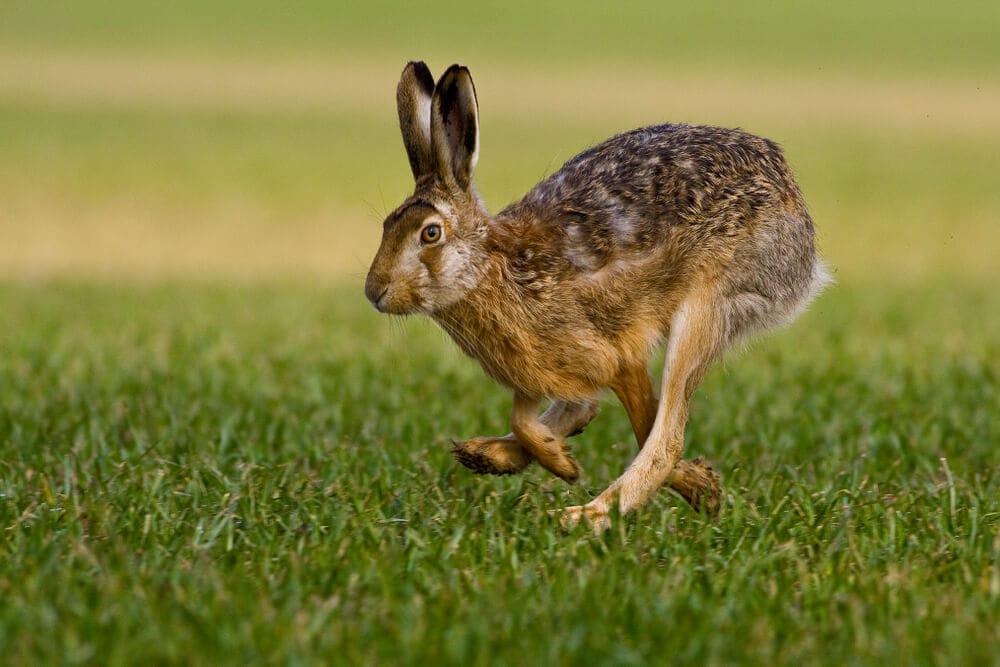
They also do not have as many children per pregnancy as rabbits. Ultimately, they are quite different but the largeness is what is most important about the Hare. Their speed as a result of this can be quite impressive. They are able to reach speeds of up to 45 mph on average, but it can seem faster. Since they are relatively small, they can navigate around a particular area much better than larger predators. This ability allows them to escape harm quite often. Therefore, most predators have to be incredibly sneaky to catch them.
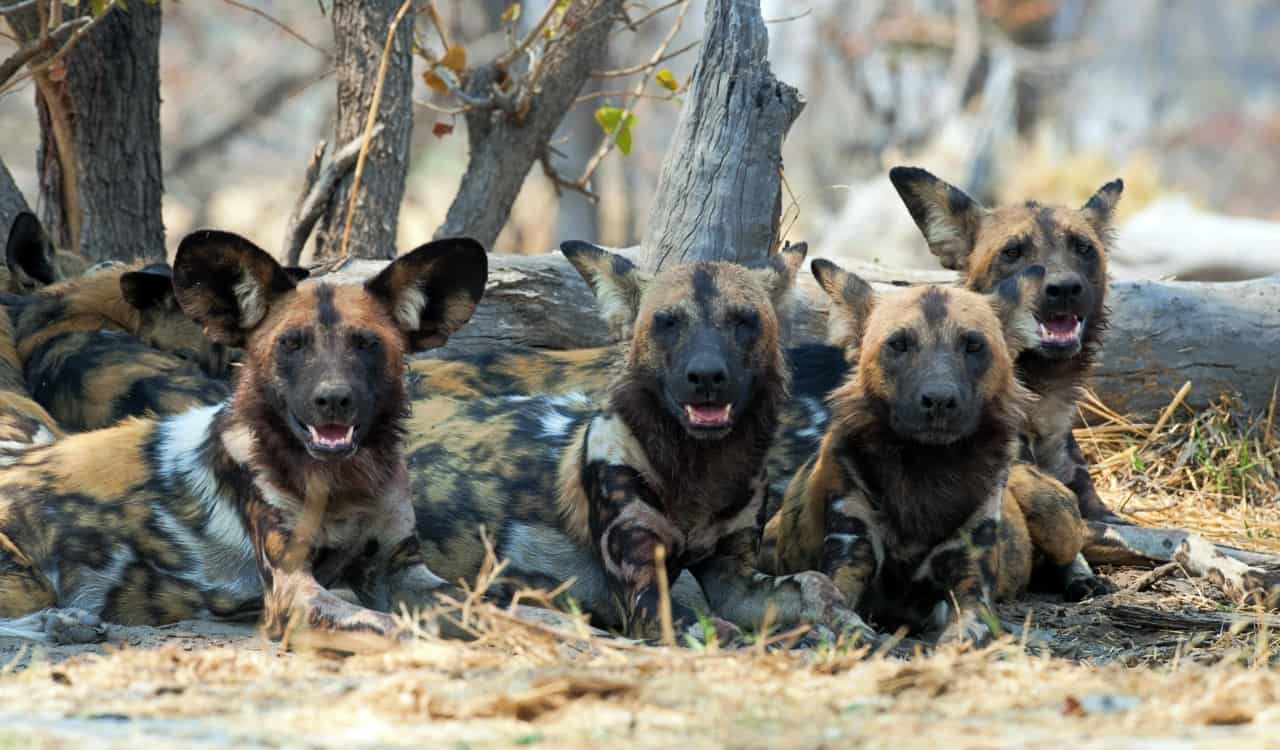
African Wild Dog
- Speed: Around 44 MPH
African Wild Dogs are pretty much exactly as they sound. Unlike the larger Hyena species that might appear somewhat like a dog species at times, the Wild Dogs actually are part of the K9 family. They are actually the largest native canine species in Africa. As weird as it might be for wild animal, they are incredibly social and have been known to interact well with humans. In fact, the African Wild Dog species has been used in hunter/gatherer societies across Africa for thousands of years. Their use among humans even dates back to predynastic Egypt or roughly 3500 BCE.
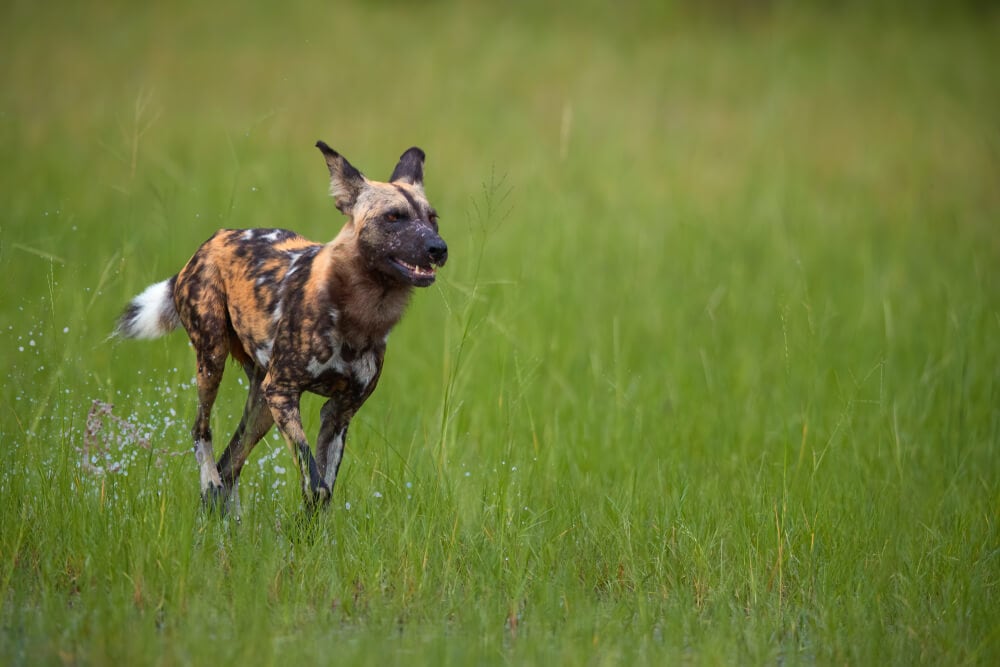
The only natural predators African Wild Dogs face regularly are Lions and Hyenas. Yet Wild Dogs are faster than Hyenas while capable of running for longer periods than either male or female lions. Wild Dogs themselves mostly feed on antelope. All of this is why it is not shocking they are among the fastest animals on the planet. They have to be to escape predators while also being able to catch the incredibly fast African antelopes.
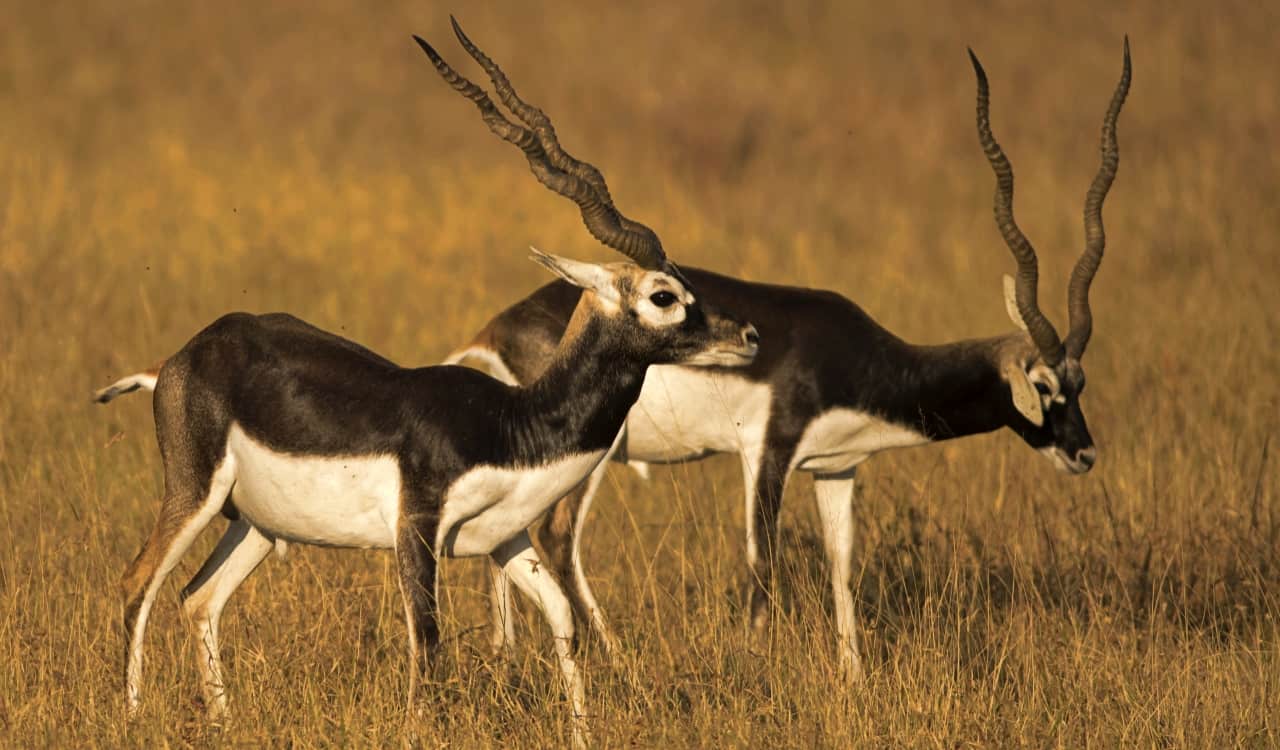
Blackbuck (Indian Antelope)
- Speed: 45 to 50 mph
The Blackbuck species is often referred to as the Indian Antelope for a few reasons. First, it is only located (as of now) in the nation of India. Some of them have been located in Bangladesh but it was hunted to extinction. A small population is currently located in Nepal as well. The species was also introduced in the United States within the state of Texas. As of the 2000s, the Blackbuck is said to be roughly 35,000 strong in the state. However, the largest population is clearly in Texas.
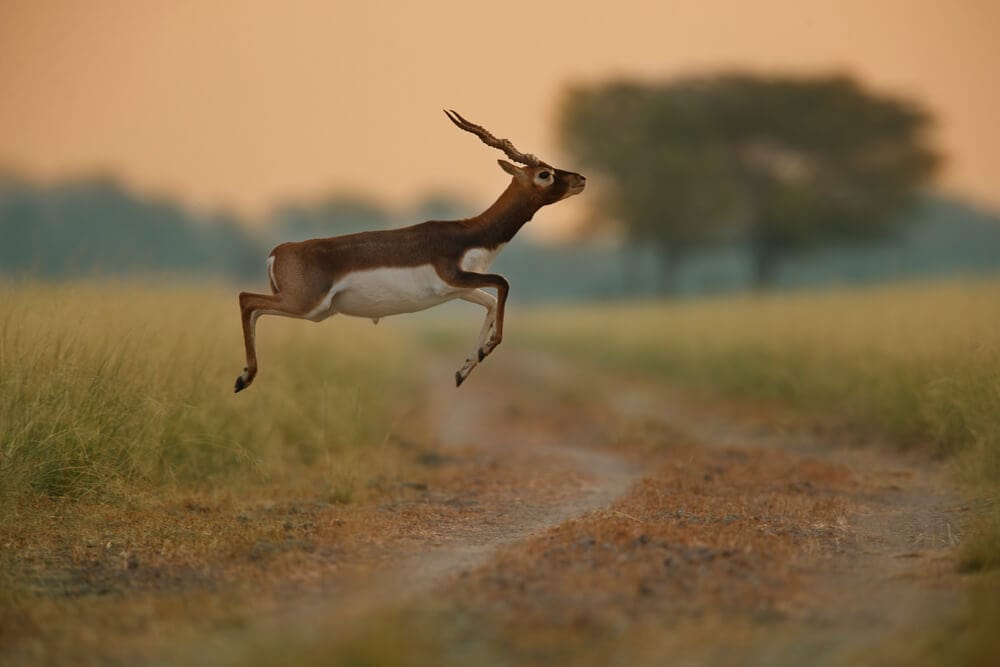
Of course, they are also an antelope species. This is not to be confused with deer or another horned animal species. Of course, the predators Blackbucks will face will differ depending on where they’re located. However, by and large, the biggest threat the species faces is being hunted by man. This became such a problem that the Blackbuck became locally extinct in parts of India by the 1970s. They are capable of moving between 45 and 55 mph, with a normal average of 50 mph. Therefore, they can escape the most known predators. Bullets just tend to be much faster.
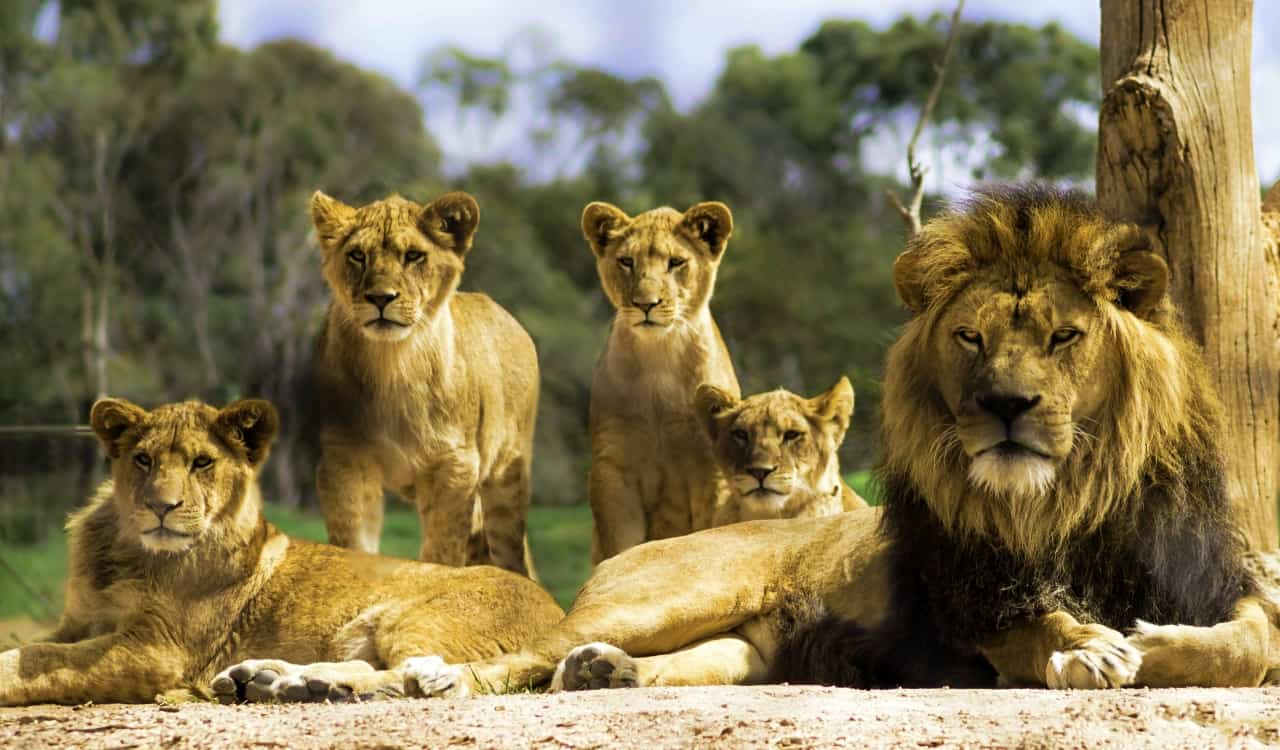
Lions
- Speed: Around 50 MPH
Not everything referred to as a “lion” is actually part of the species. Lions themselves are part of the “Panthera” species line, grouped with Panthers, Leopards, Jaguars, etc. This is not to be confused with Pumas (or Cougars). In the Southern United States, this species is often called Mountain Lions. They aren’t real lions, therefore we’re referring only to Lions natively found in Africa and parts of Asia.
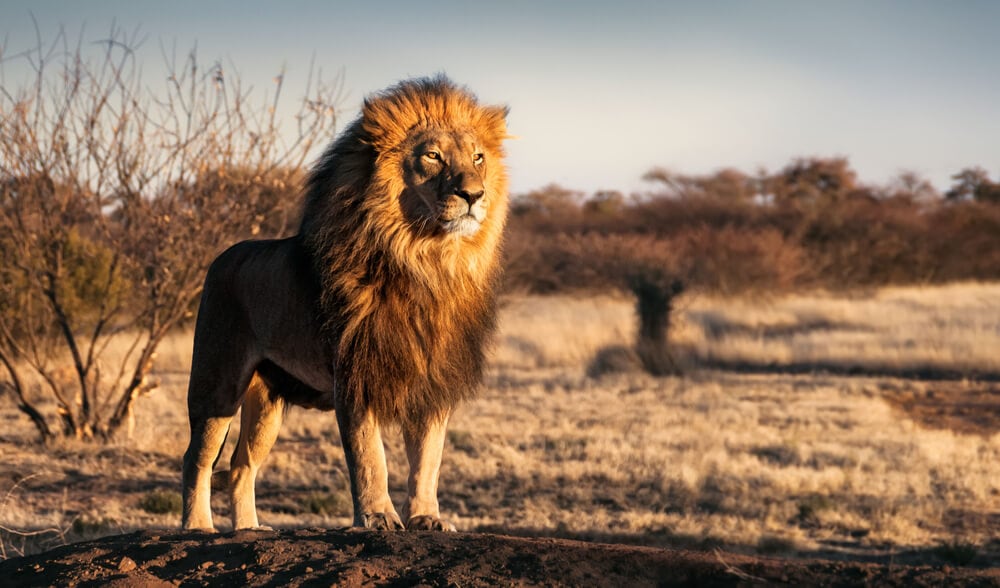
The difference between the males and females of this species is quite obvious, with only the males usually having a broad mane. The females are the ones that birth the young, take care of them, and even handle most of the hunting. They actually have to keep their young away from even the fathers, as male lions have been known to eat their cubs in the past at times. As far as speed goes, male lions are capable of reaching pretty high speeds. They could reach 30 to 40 mph if they try hard enough, but they cannot maintain it for long. Females, on the other hand, reach 50 mph on average and can maintain this speed for a while. Clearly, the ladies are the ones to fear most.
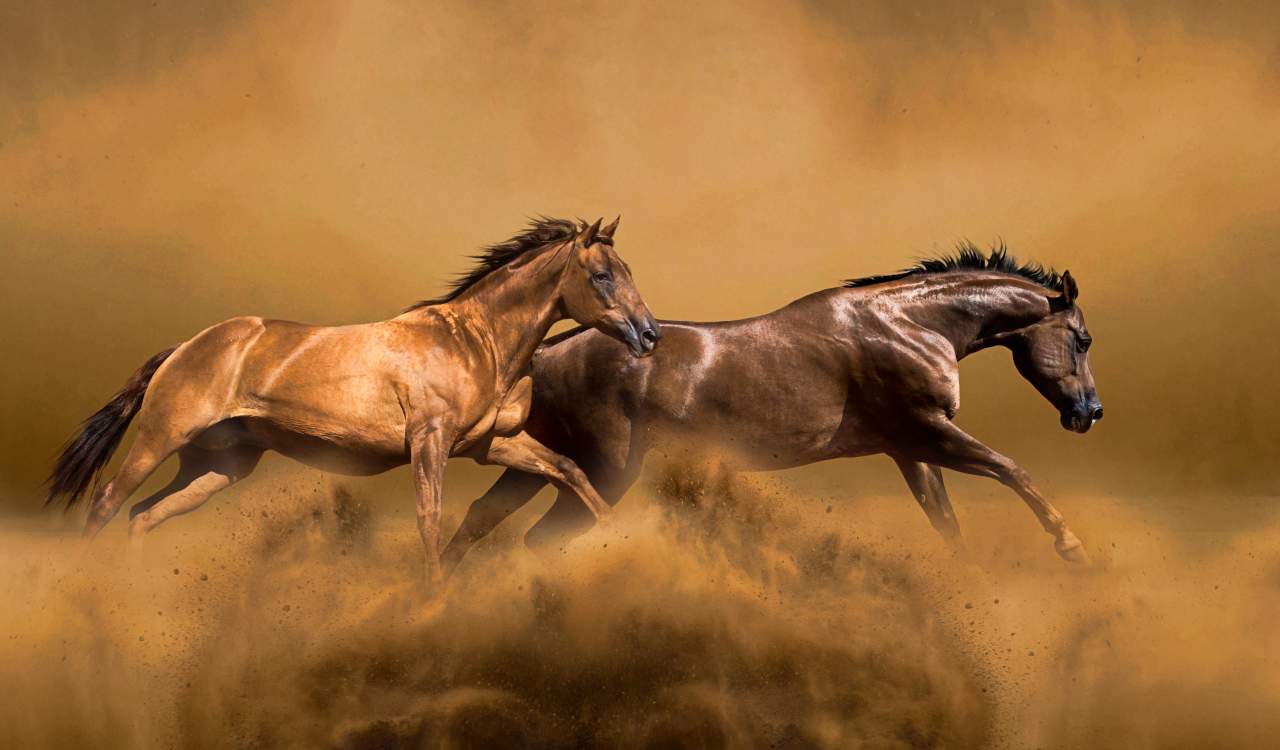
American Quarter Horse
- Speed: Around 55 MPH
We had a bit of trouble considering which horse species to add to this list. While we loved the American Quarter Horse, it is actually the Thoroughbred Winning Brew that can move the fastest. However, this is not technically true. In our research, we found that the Winning Brew has the world record for the fastest speed from the starting gate on an official racetrack. However, this speed reach was around 43 mph. Winning Brew horses can reach up to 60+ mph if pushed to it. Yet it cannot hold to any high speeds for very long.
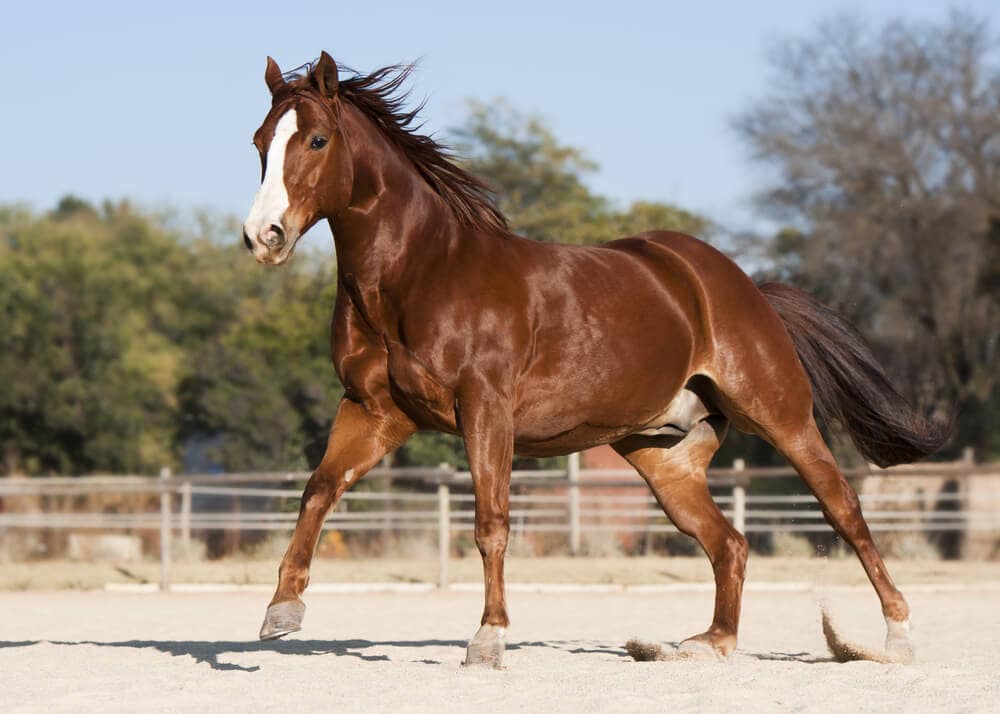
Meanwhile, the American Quarter Horse is capable of reaching near the record limits of the Winning Brew. At the same time, it can maintain higher speeds for a lot longer. They tend to top out around 55 mph at their fastest. Yet they could likely maintain a speed of 45 to 50 mph for quite a while, making them great horses to use for travel purposes. If you wanted to get somewhere quickly, of course. The Quarter Horse is actually only American too. It began here after extensive breeding involving English and Native Horses in the 1600s.
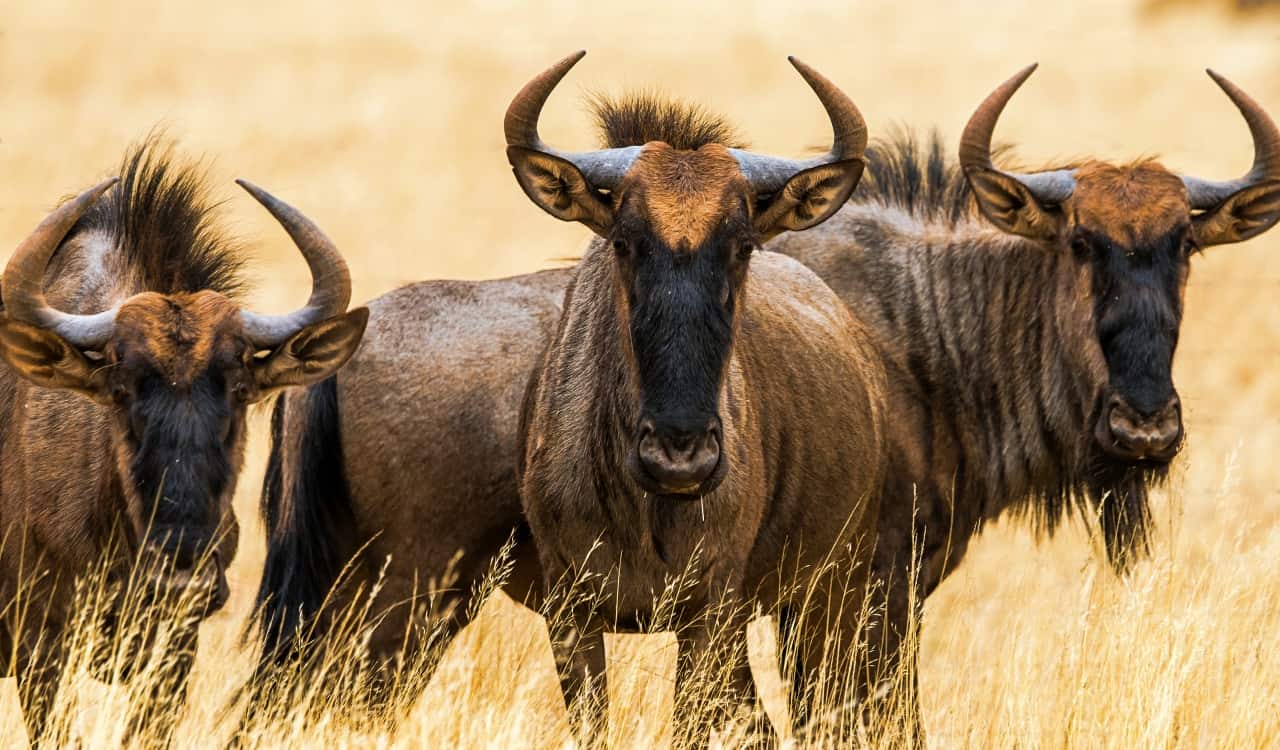
Blue Wildebeest
- Speed: 50 to 55 MPH
Any species of Wildebeest should be considered a threat. This species does not like to play around, and they have been known to attack humans if needed. Most Wildebeest tend to travel in relatively large groups. At times, this can cause major stampedes of sorts, wiping out pretty much anything or anyone in their path. In fact, it is the Wildebeest that technically killed Simba’s dad, Mufasa! Of course, the Blue Wildebeest (or Common Wildebeest) is the fastest of the known types.
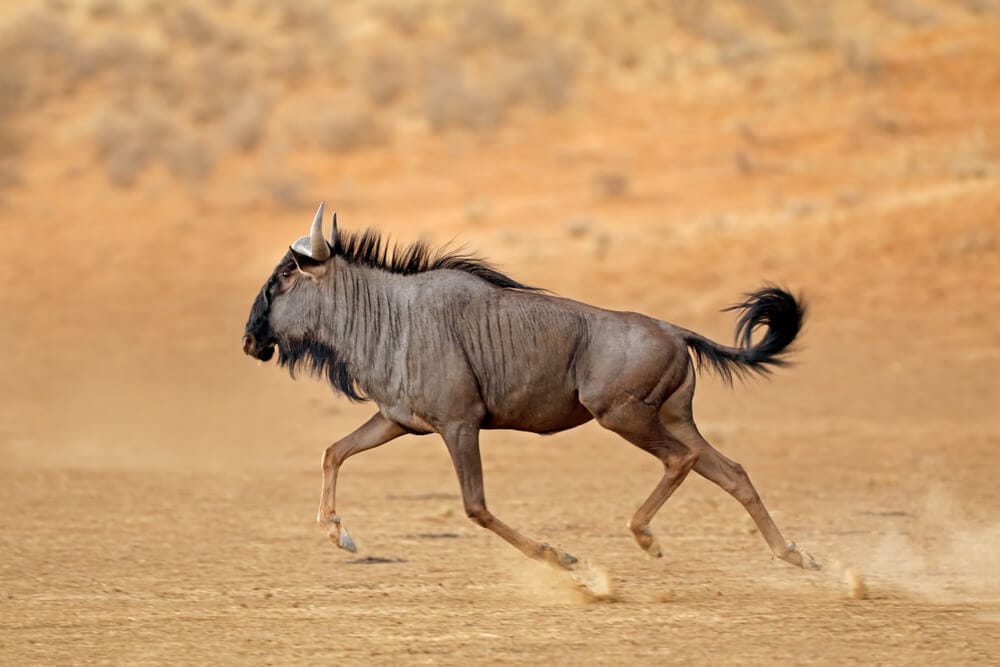
Blue & Black Wildebeests have often mated in the wild, leading to some hybrid versions. Yet this is not usually common. Contrary to other horned creatures in the wild, both males and females have horns. Of course, males tend to be larger all around…including in horns. They need these horns too, as they are preyed on by several predators in the wild. This includes some of the animals listed already like lions and African Wild Dogs. Yet they deal with others too. Therefore, being able to maintain their 50 to 55 mph speed total is important. It is said they could run at this high-speed for several miles before needing to stop. More than enough time to outrun most predators.
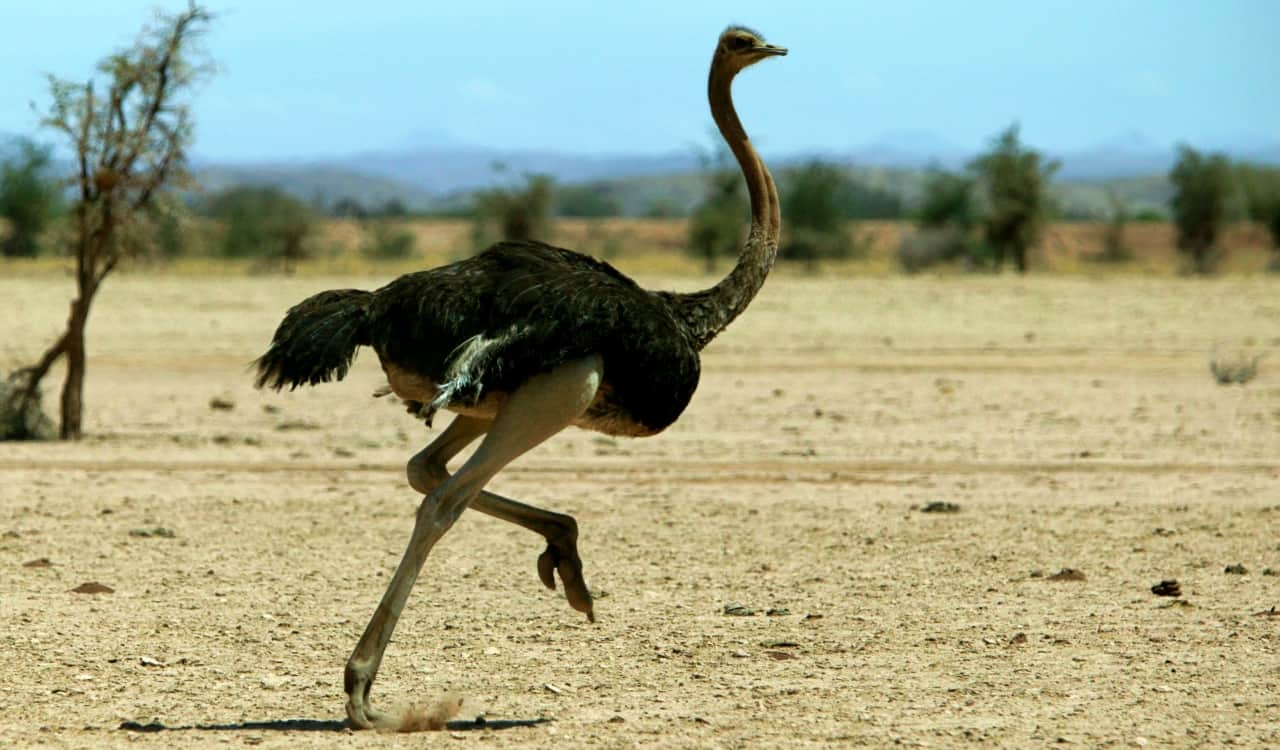
Ostrich
- Speed: Around 45 to 60 MPH
The Ostrich is a relatively large bird species mostly native to various places across the African continent. Funny enough, they are not actually native to Australia but some were brought over many years ago. A small flock escaped and managed to survive as well as thrive in the Australian wilderness. Today, a small amount of them still live there. As mentioned, this is a large bird species, which commonly belongs to the Ratite species. This is basically the species list that includes all large, flightless birds.
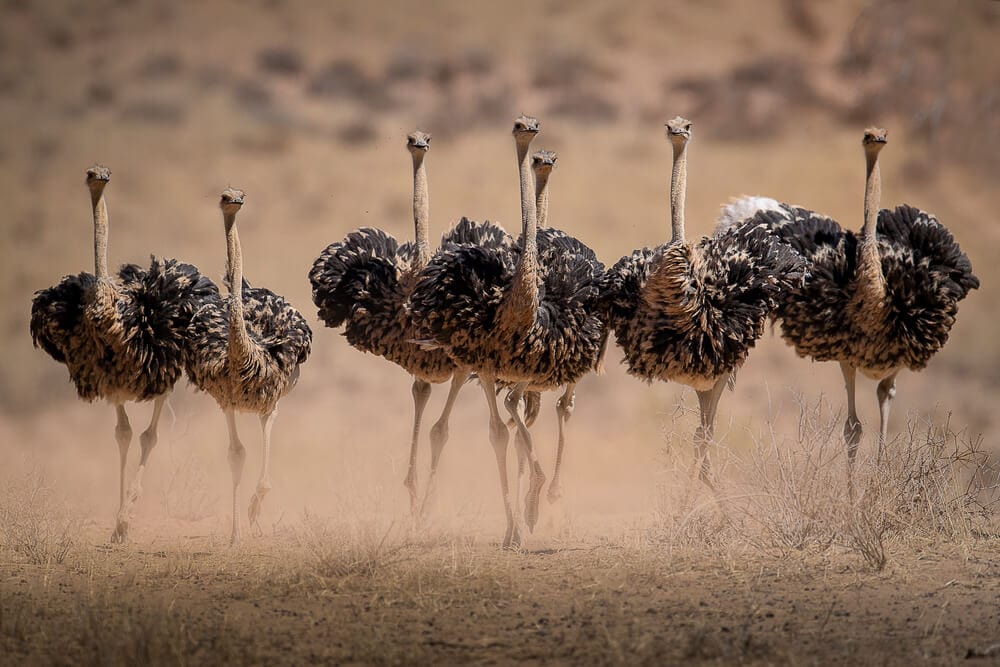
Besides the Ostrich, animals like the Emu & Kiwis are part of it. Sadly, in spite of the 7 versions of Ostrich, only 2 versions still remain due to the others being hunted to extinction. Ostriches usually travel in flocks, which is done mostly to help fight off predators. Ostriches are capable of stomping creatures or people to death. Their sharp beaks and claws are nothing to scoff at either. It is impossible to outrun them too. Ostriches are capable of reaching up to 60 mph in speed in short bursts only. For longer runs, they tend to remain at about 45 mph.
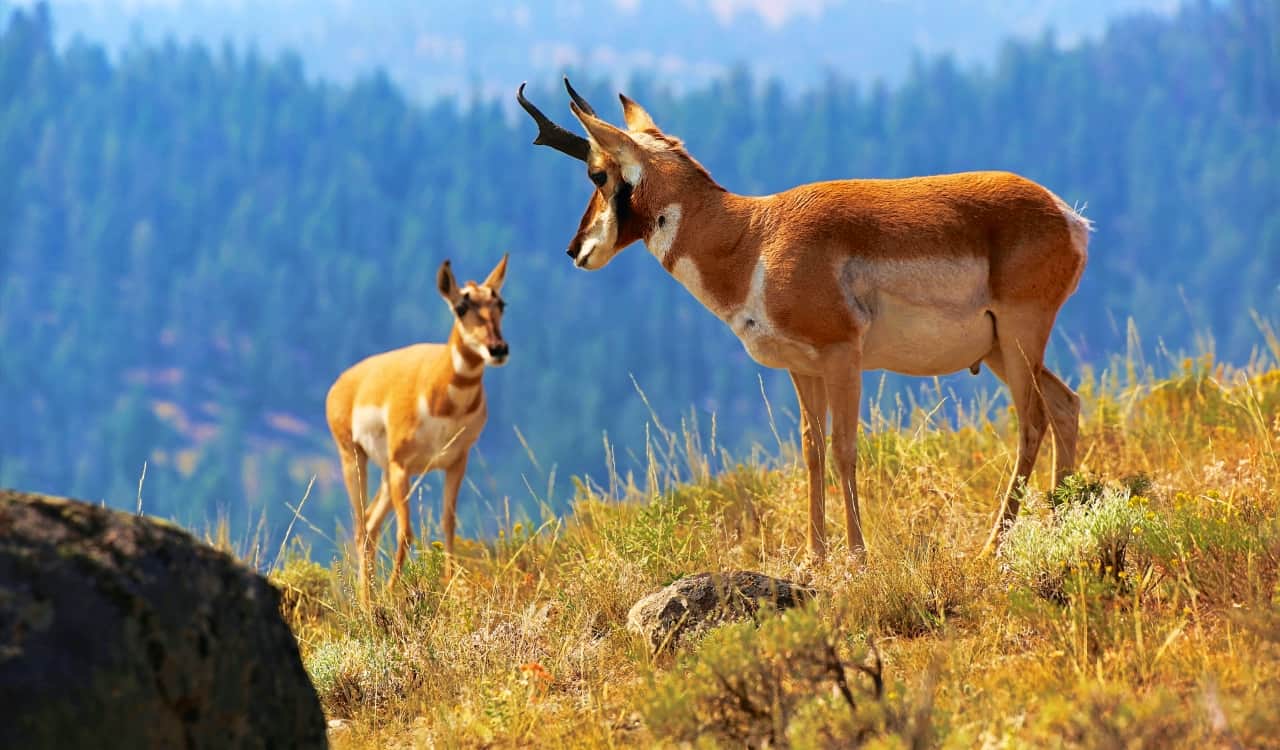
Pronghorn Antelope
- Speed: Around 60 to 65 MPH
Pronghorn Antelopes are mostly located in North America. A little bit of house-cleaning needs to be done first on them, however. They are not actually antelopes, as they technically belong to the Artiodactyl species. Pretty much, this species involves anything with hoofs that bear weight equally on two of their five toes. There are both even and odd versions of this. Within that species is the Giraffoidea, which the Pronghorn officially belongs to along with the Okapi & Giraffe. However, due to looking so much like antelope, North Americans adopted the term and used it to describe them.
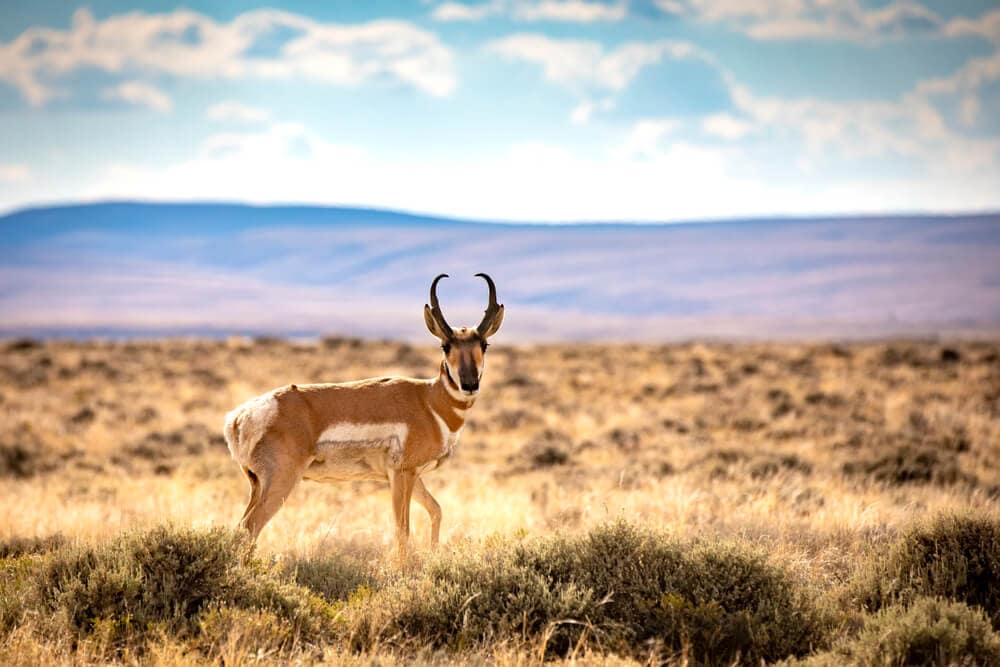
Therefore, it is mostly a colloquial use of the term. That said, their speed is quite impressive as they are among the fastest animals in North America. While the species travels in mixed herds during the winter, or basically their mating season, they break up where males form bachelor herds. Some even pop up to help defend all-female herds too. Females are actually the most aggressive and dominant of the species. Yet males are the fastest, moving upwards of 55 to 65 mph. Females tend to move between 40 and 50 mph on average.
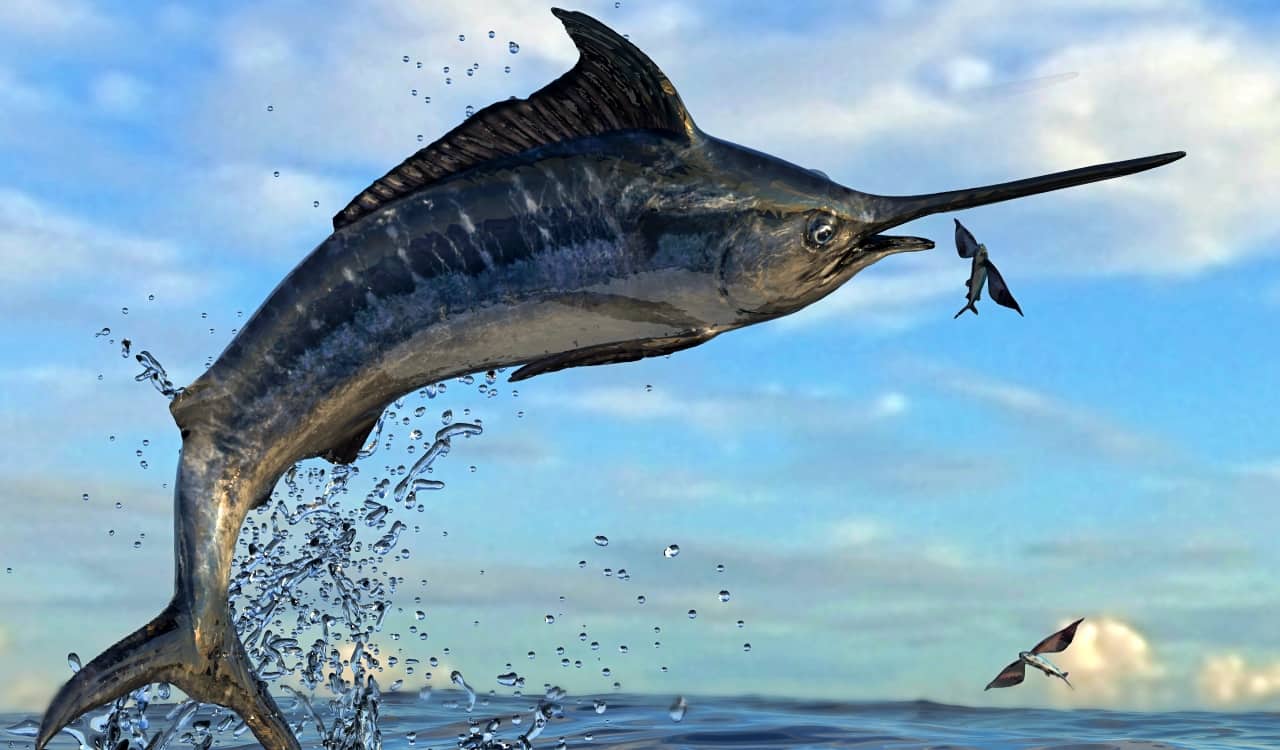
Sailfish
- Speed: Around 68 MPH
Our first fish on the list, it is obvious now that we’re not only going to be referring to land animals and how fast they run. We’re also going to discuss the fast swimmers in our world’s waters. The Sailfish is among the fastest in the water, with the highest recorded speed netting a huge 68 mph in the water. While they often look like swordfish, they are not related. Of course, the Sailfish is located only in saltwater with just two species known as of now.
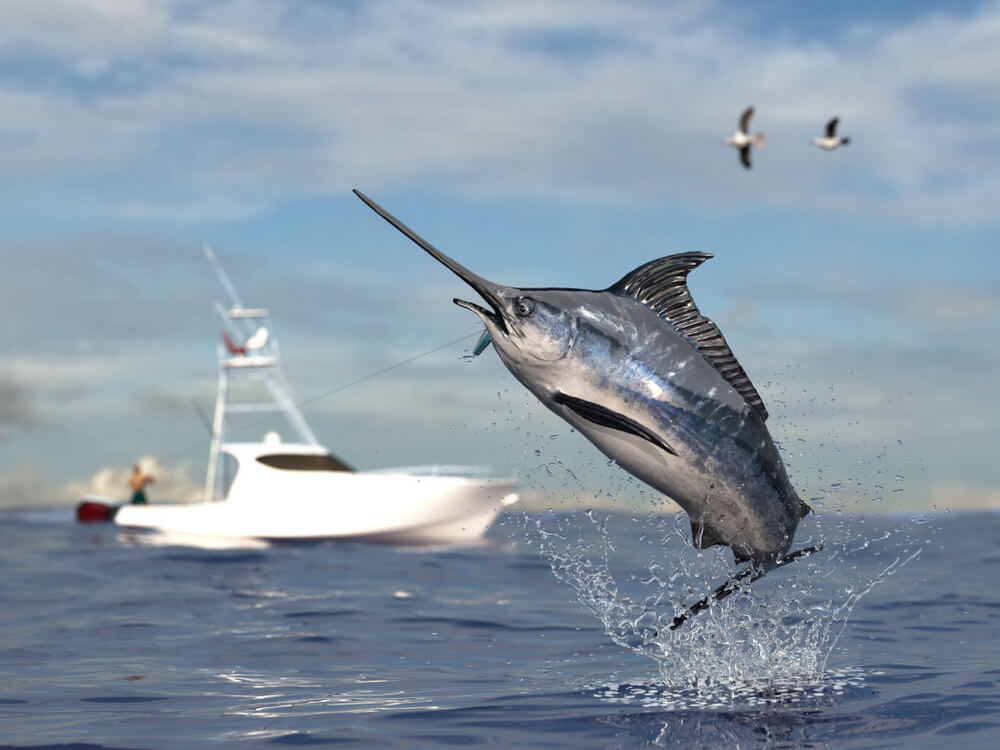
Both tend to be native to different areas of the Ocean. One is located in the Indo-Pacific area of the Ocean, while the other is located in the Atlantic Ocean. Due to this, they tend to be quite common to come across for people. On top of that, this species is said to have been around for quite a long time. It can be traced all the way back to the Paleocene period, which is between 55 and 65 million years ago. That predates modern-day human beings!

Cheetah
- Speed: Around 50 to 75 MPH
Said to be the fastest land mammal on the planet, the Cheetah is one heck of a predator. You’ll mostly find them in Africa but many have navigated into lower portions of Asia from time to time too. They used to be a lot more common here centuries ago, especially when kept as pets. However, they have since mostly been in the African territory as one of its apex predators. The Asiatic Cheetah is, obviously, the only surviving Cheetah species in Asia. They are sadly on the Critically Endangered list too. This is actually the species that were kept as pets by humans.
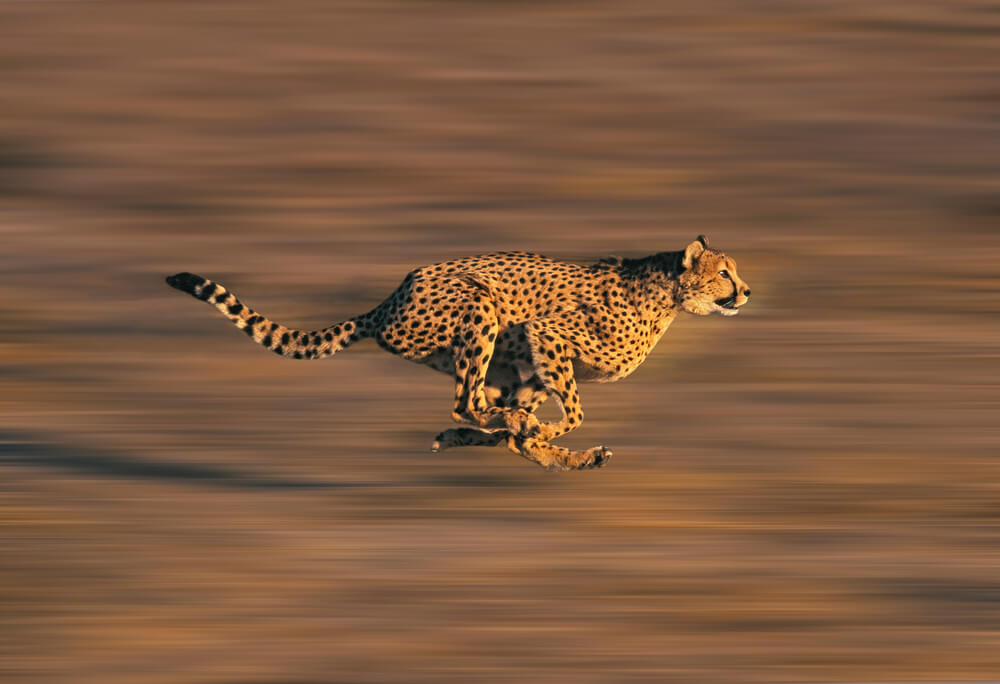
For some reason, they are a lot more docile around human beings than their African counterparts. This very well could be from centuries of human interaction, but it is uncertain. Every species of Cheetah is fast, however. The Asiatic Cheetah is a bit leaner, making many assume it is naturally going to be faster. However, African and Asiatic Cheetahs are really no different in this area. Both can reach top speeds of 70 to 75 mph in sprint sessions. But in something like a mile-long chase, they’ll go down a little lower. However, they don’t chase like this very often.
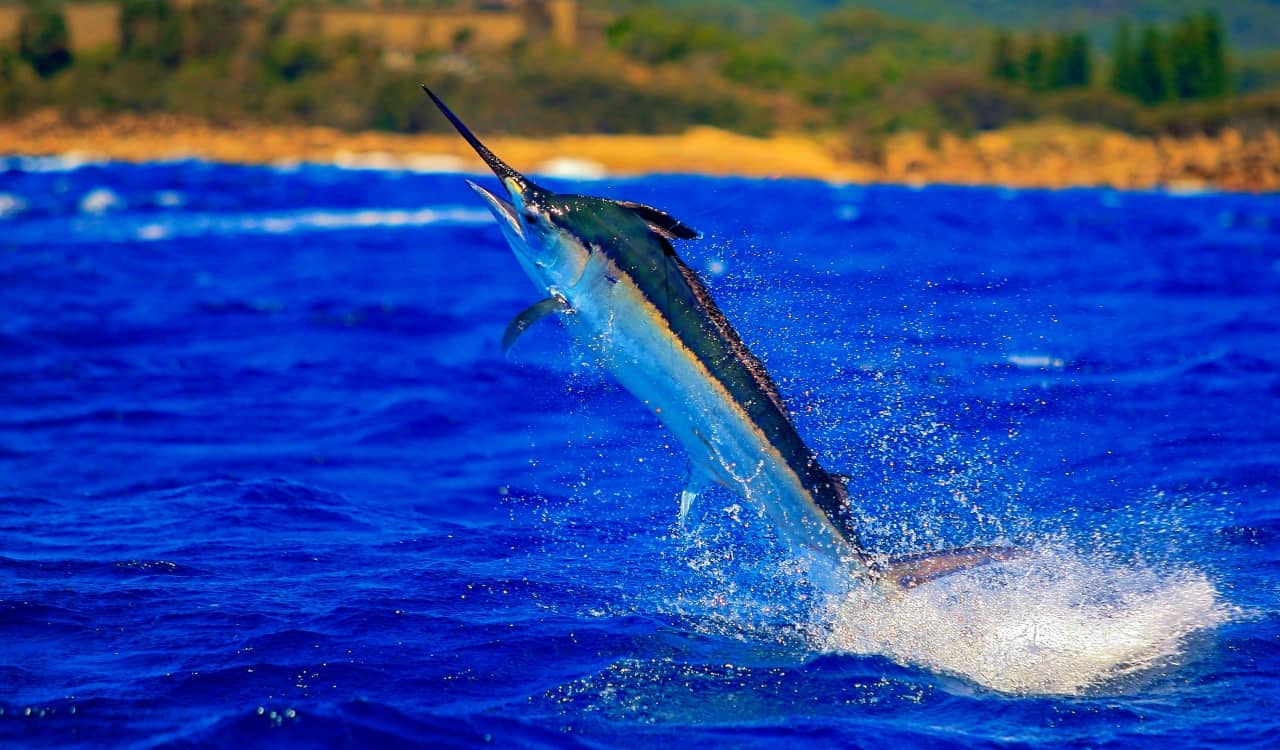
Black Marlin
- Speed: Around 82 MPH
Black Marlin are considered to be among the fastest fish species known. While a lot of people believe that the media has overhyped their speed for years, Black Marlins are actually incredibly fast fish. They do not typically show this, however. That is why most records of speeds have them top out around 22 mph. In spite of this, there have been instances when they needed to go faster and that once led to a recording of around 82 mph.
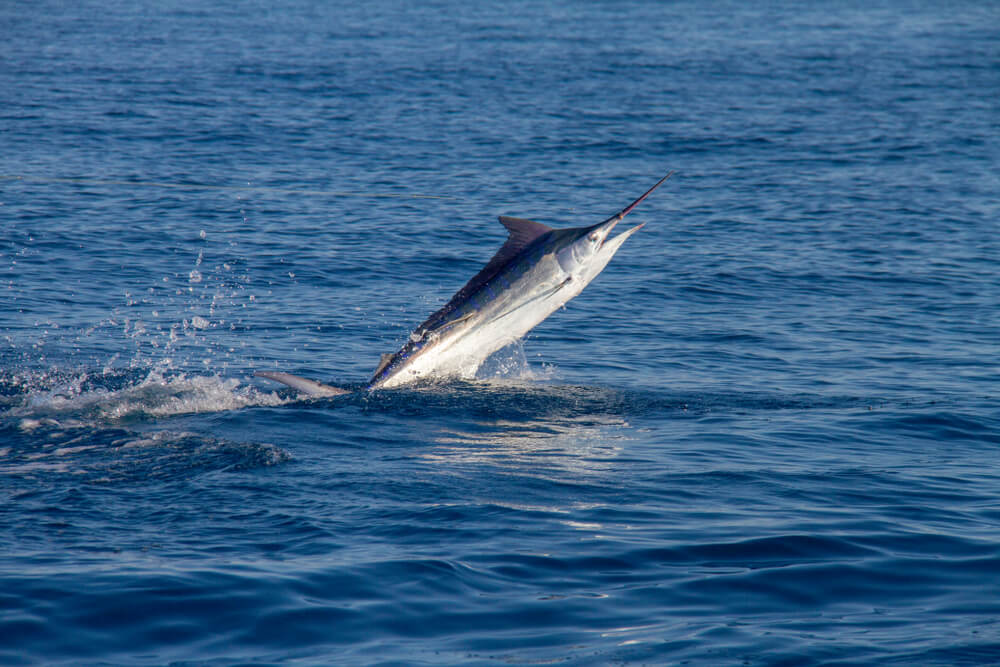
It might seem odd to trust one or two reports on speed, but they were said to be from marine biologists. Either way, we’re taking the reports to be accurate. That said, the Black Marlin species is by no means a small species of fish. They are able to get a little over 15 feet in length and weigh in at over 1,600lbs. While it is rare to see any fish completely top out like this, they are all going to be at least somewhere around half of this or more. In our book, that is pretty dang large. It’s not shocking that they are able to move fast. Anything that makes larger strides or larger movements can cover larger ground.
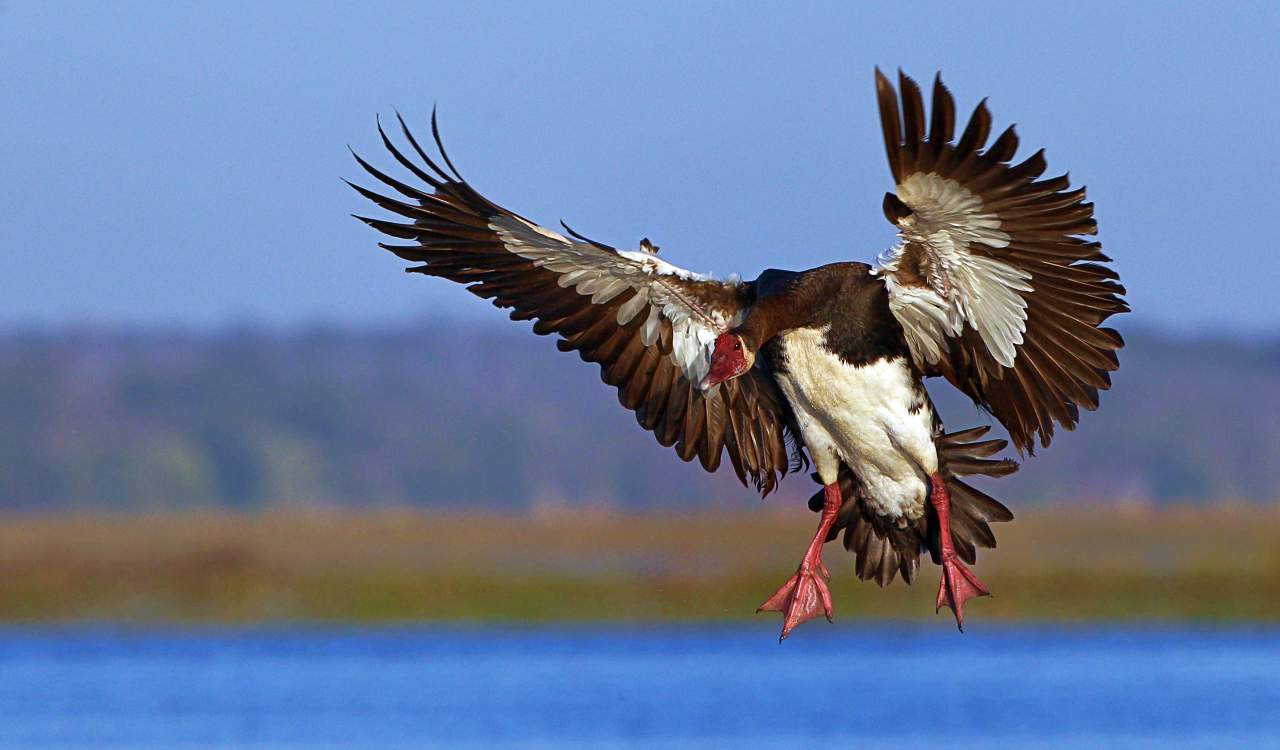
Spur-Winged Goose
- Speed: Around 88 MPH
While seeing a goose pop up on our world’s fastest animals list might seem odd, it is true that they are quite fast. However, most are not known for being incredibly impressive flyers. Rather, geese tend to stay low to the ground and float around water sources most of the time. Of course, the Spur-Winged Goose does like to do this a lot too. However, when they need to get from place to place, they do not like to take their time. This is why they are able to fly up to a speed of 88 mph.
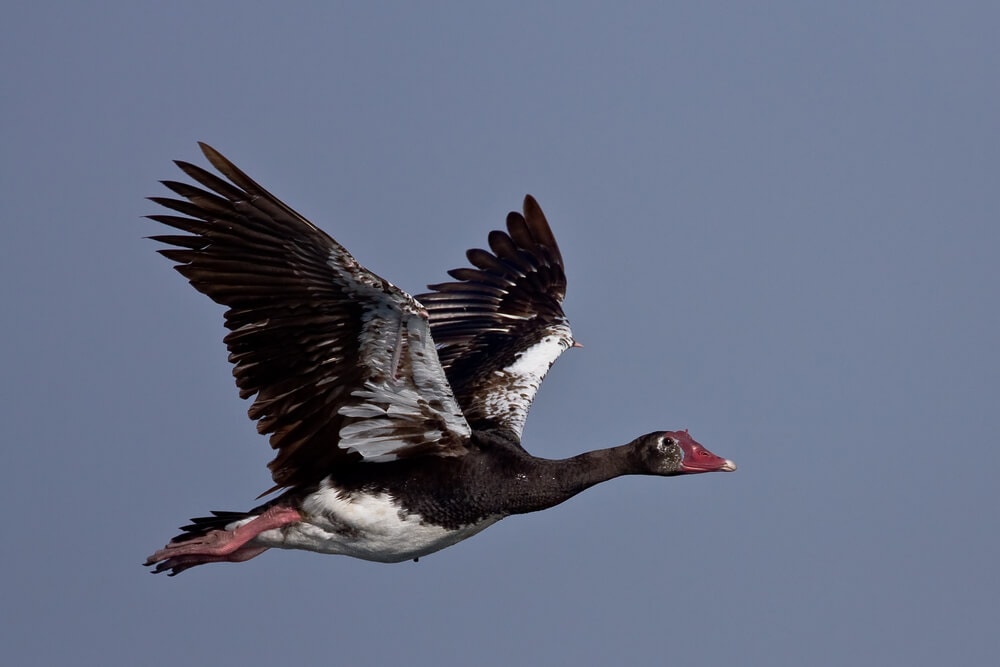
While they have popped up in captivity in various places across the planet, they are only native to the African continent. In particular, they tend to be in the upper center all the way to South Africa. Several African Tribes have been hunting and eating them for a regular food source for years. They are on the “least concern” list for IUCN, which pretty much means that they “could” go extinct but it’s unlikely for a while. Therefore, no type of major conservation has taken place for the species.
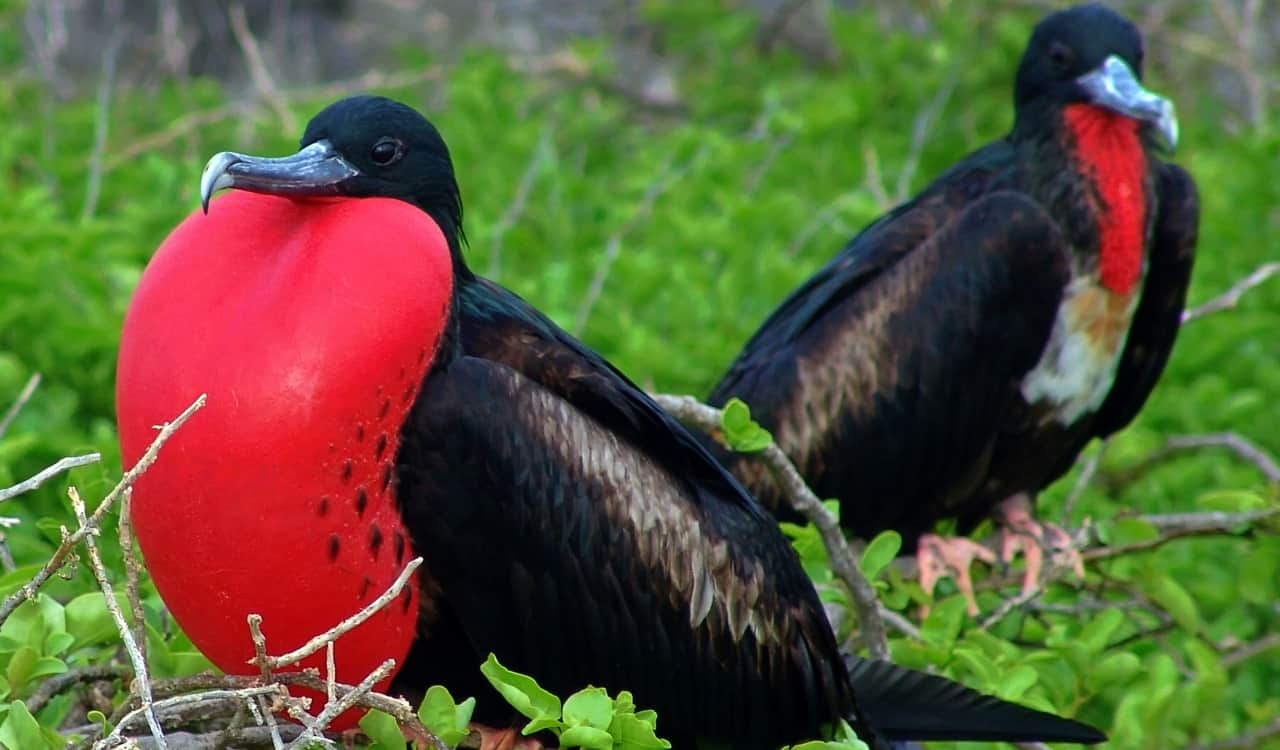
Frigate Bird
- Speed: Around 95 MPH
While we mostly refer to this species as the Frigate Bird, they might also be written as Frigatebird by some. Both are technically correct. Yet they have also been called Man-O-War Birds by English Mariners when they were spotted in the Caribbean. This might have to do with how large they tend to come off, considering Man-O-Wars are among the largest ships. However, they are not exactly massive. They have a wingspan of slightly over 7 feet, which can be a lot when you’re around them. Yet this is not a top-end wingspan at all.
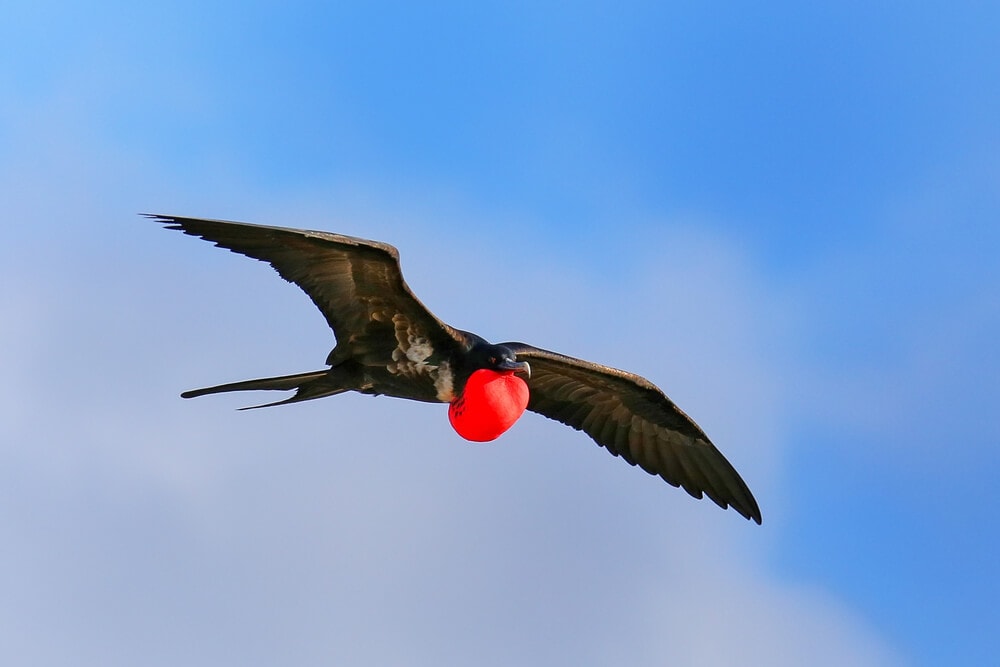
In spite of this, it seems those wings are certainly strong enough to give them impressive speed. They can reach just under 100 mph, with a top-end speed of 95 mph recorded. You’ll see the species all over the world, especially when it comes to islands and even random ships all across the world. They are not called Frigate Birds because they like to stay in trees. Obviously, you’ll see them hang around ships a lot. You’ll notice them quite easily, due to their very distinct red gular pouch. You truly cannot miss them!
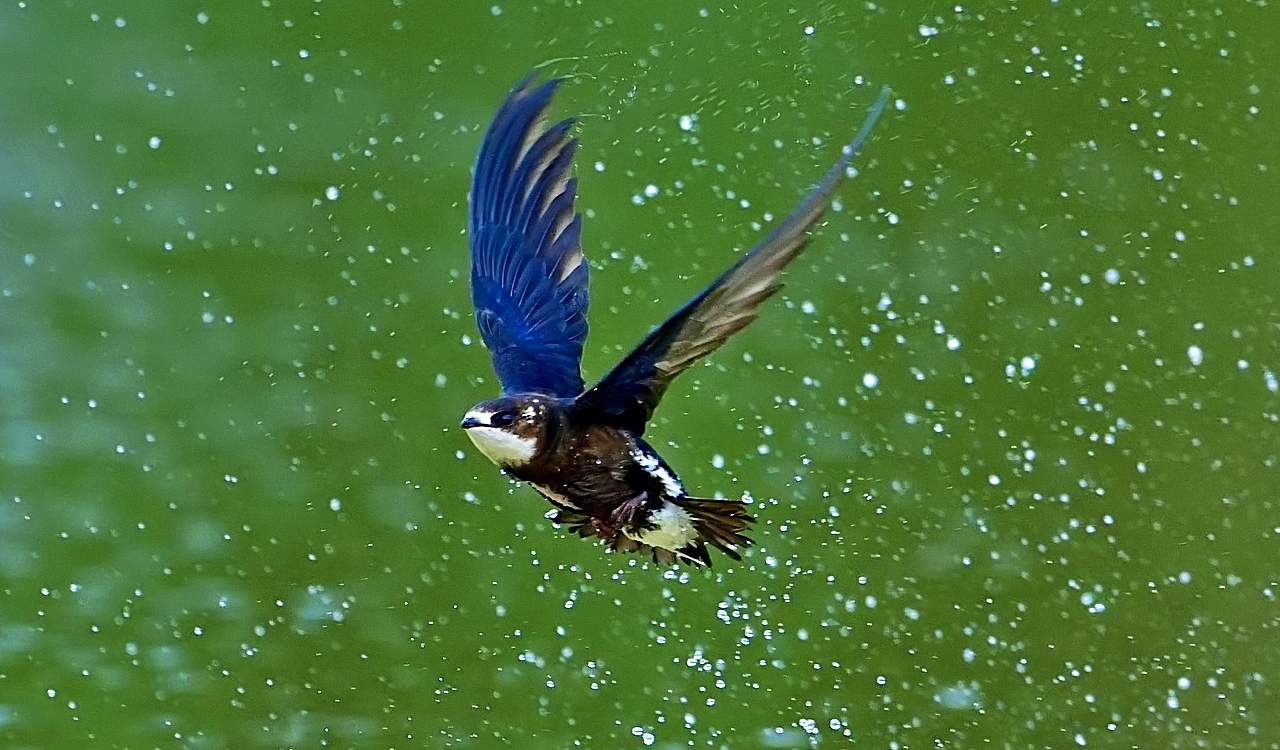
White-Throated Needletail
- Speed: Around 105 MPH
The White-throated Needletail is a very compelling bird. It is capable of reaching speeds that, normally, would be quite difficult for a bird of its size. They tend to only measure out to about 20 centimeters and weigh between 110 to 120 grams at their absolute maximum. However, they can still reach 105 mph in horizontal flight, making it one of the fastest animals known. While small birds cannot normally reach this speed, they actually have a slightly large-looking build with a barrel-like body.
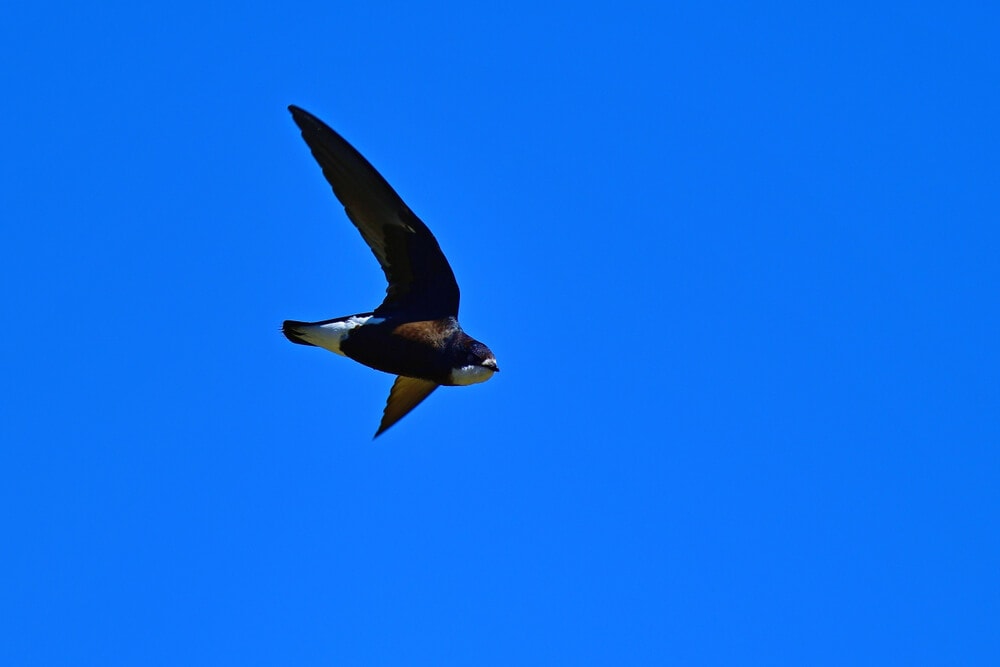
The species migrates quite often, which is why you’ll often see them breeding in Central Asia & Siberia. Yet they will go South for the winter in numerous areas throughout Southeast Asia, including India. However, you might see them go as far south as Australia. While rare, they have also navigated into Western Europe too. You’ll be able to know of the species once you see them, as it’s in the name. They tend to be grey or greyish-brown (or blue) except for in one area, the throat. This is accompanied by a small white patch too. This extends out into the tail, of course.
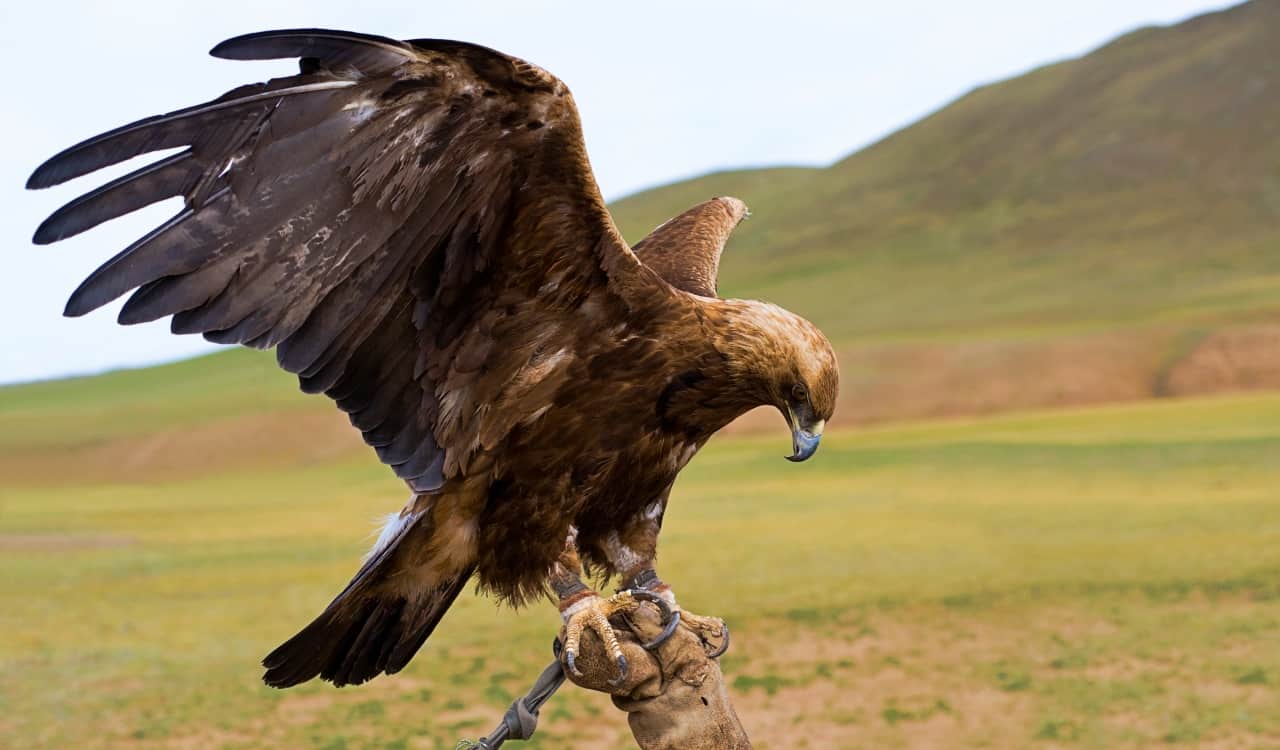
Golden Eagle
- Speed: Around 150 to 200 mph [in-flight] & 67 to 89 mph [diving]
If you have never seen a Golden Eagle, we recommend you check them out as soon as possible. They are absolutely beautiful creatures that can be spotted all over the place. While you can usually spot them throughout Europe & Asia, they are also native somewhat to North America. They tend to breed in the upper sections of the continent but will live in the lower-end. It is odd for North American Golden Eagles, as there are breeding and non-breeding types split up pretty much by whatever coastline you’re on.
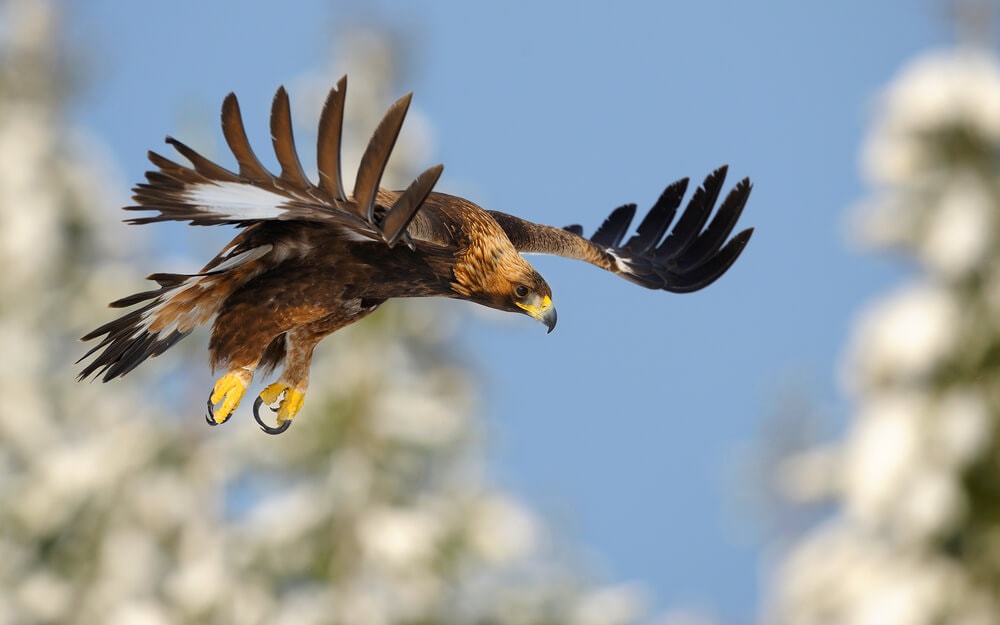
While Americans note the Bald Eagle as the national bird, Golden Eagles are often protected too. This is not uncommon across the world, as mankind has been fascinated with the species for centuries. This is why many have become pets or assets to hunters and military officials. They are beloved for their speed too. In normal flight, they can reach upwards of between 150 to 200 mph. Yet while diving, they can reach 67 to 89 mph. Both have been recorded by man, which is pretty incredible when you think about such speed. They are clearly one of the fastest animals in the world.
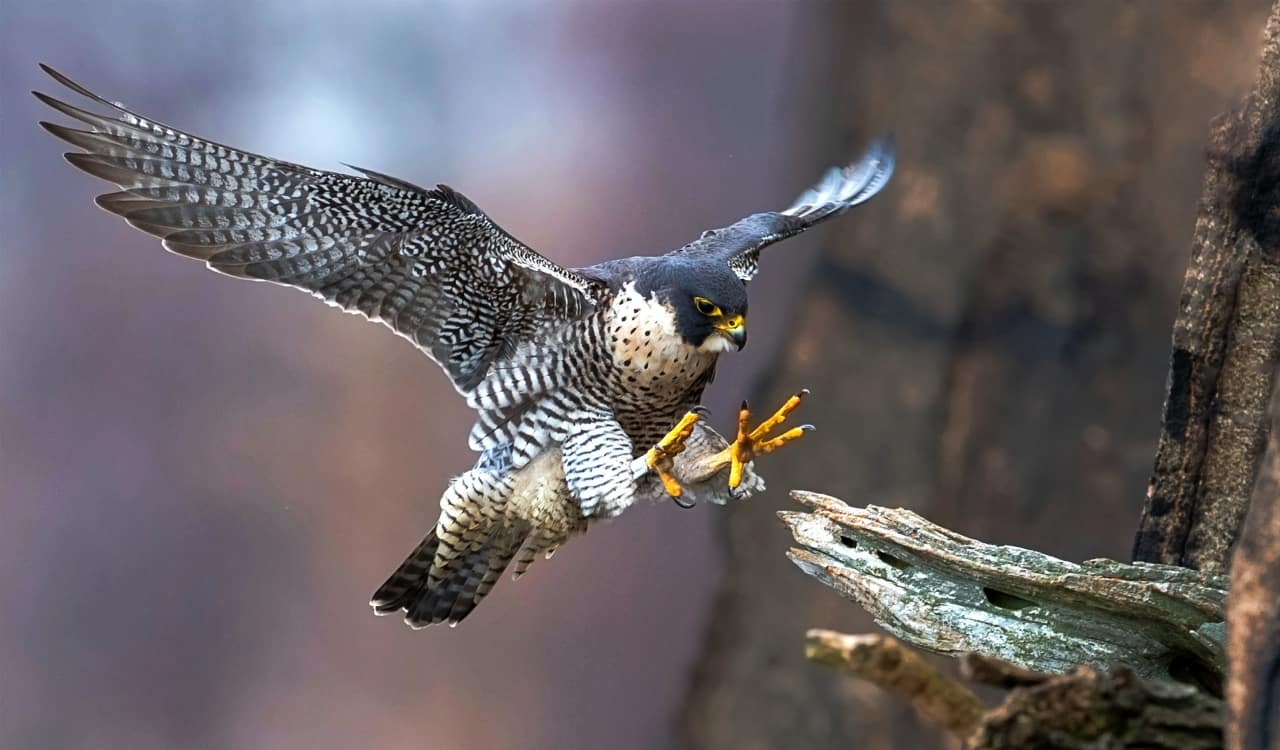
Peregrine Falcon
- Speed: Around 242 mph [in-flight] & 108 mph [diving]
The infamous Peregrine Falcon is respected in many cultures across the planet for its speed and hunting prowess. They live in every continent in some form except for Antarctica. Therefore, it is not shocking that you’ll see numerous subspecies of the main species, depending on the location. As of now, only 19 subspecies are recognized. Mankind has utilized the Peregrine for a very long time. It is respected due to how versatile it can be but also because it is one of the easier birds of prey to train for humans.
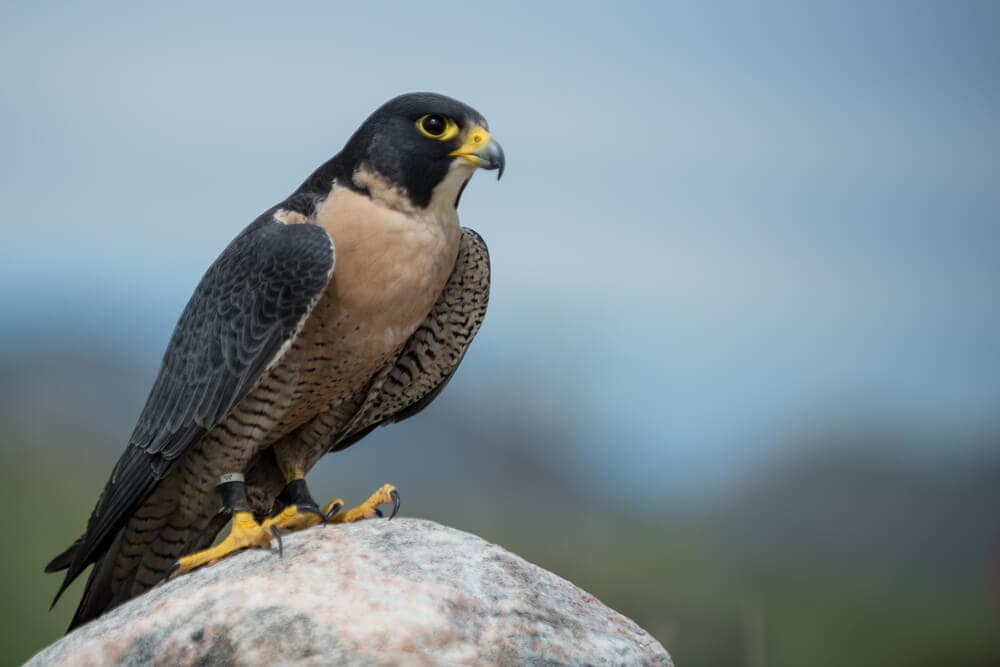
While for man, it will help hunt large game or spot some for them, it does not often hunt the same types of things. In fact, the Peregrine Falcon feeds more on other birds than any other animal. This includes small to medium-sized birds like songbirds, pigeons, doves, swifts, waders, you name it. They do tend to stay away from other falcons or the larger eagle. They can keep up with anything, however. Peregrines have an impressive dive speed of 108 mph with a horizontal flight speed of up to 242 mph recorded. This makes it not one of the fastest animals but THE fastest animal recorded.

